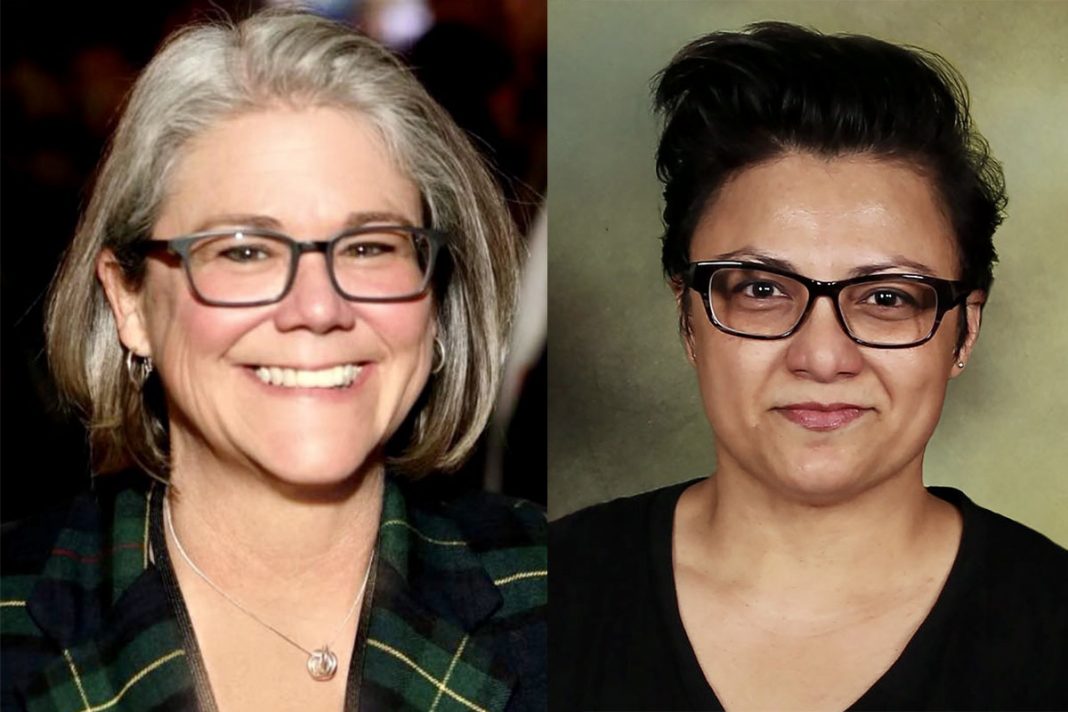Two Penn State Berks professors are working to help students in STEM majors garner more of the core skills and knowledge offered in the humanities in an effort to gain a more complex understanding of how their disciplines and careers relate to humanity and the face-paced global economy.
They were recently awarded a $350,000 “Cornerstone: Learning for Living” grant from the Teagle Foundation and the National Endowment for the Humanities to implement the Keystone Certificate, developed by the professors, at six additional Penn State campuses, including Abington, Behrend, Harrisburg, Lehigh Valley, Scranton, and University Park.
E. Michele Ramsey, associate professor of communication arts and sciences, and women’s, gender and sexuality studies, and Cheryl L. Nicholas, associate professor of communication arts and sciences and global studies, developed the Keystone Certificate for Penn State Berks with a planning grant from the same two organizations in 2021. The goal of the new grant is to create and implement distinct versions of the Keystone Certificate that are specific for each campus.
The Keystone Certificate includes two required courses – Humanities 101 and Humanities 102 –both of which engage students in the most important issues of the day through the study of transformative texts in the humanities. In addition, students can choose two additional courses, all of which meet general education requirements, from one of the certificate’s six pathways, which include science and technology, healthcare and medicine, globalization and culture, management and organizations, environment and sustainability, and conflict and justice.
In the Humanities 101 course, students engaged with Homer’s The Odyssey to learn about leadership, and then practiced creativity and collaboration skills through the construction of a board game based on the text. In another example, students in Humanities 102 studied the intersections of media, power, fascism, surveillance and politics in George Orwell’s 1984 and the intersections of politics, war, religion, sexism and racism in Candide’s Voltaire and applied these conversations to current political, social and economic contexts.
Ramsey and Nicholas will work with campus faculty to choose texts for their Humanities 101 and 102 courses, help them design the certificate so that it meets the needs of their individual campus, and create all the advising and promotional materials for each version of the certificate. The two professors will design the certificates so that students can earn them using general education requirements to provide the micro-credential opportunity, setting them apart from other graduates, without adding time to a student’s degree plans.
The grant is part of the Teagle Foundation’s initiative, which seeks to revitalize the humanities in general education.
A report from the National Academies of Sciences, Engineering, and Medicine titled “The Integration of the Humanities and Arts with Sciences, Engineering, and Medicine in Higher Education: Branches from the Same Tree,” stresses the crucial need for higher education to integrate the fields of the arts, humanities, and STEMM (Science, Technology, Engineering, Mathematics, and Medicine).
The Keystone Certificate is designed to help students see those connections between disciplines so that graduates can avoid crucial mistakes that happen when they lack a more holistic view of knowledge and its applications to innovative tools and products.
Ramsey notes, “Many of the people who monetized Facebook now lament that they did not consider how their algorithms could possibly do damage to democracy by encouraging the dissemination of misinformation.”
Nicholas adds another example from the context of Covid-19. She states, “It is one thing to have the scientific talent to create a vaccine that saves lives, but that it’s quite another to be able to talk to the public as a scientist in a way that gains the trust of the public so that they will voluntarily get the vaccine.” These are the kinds of issues that Ramsey and Nicholas will encourage students in the certificate program to think about when they are considering their major coursework and their career aspirations.
Ramsey researched the skills and knowledge most in-demand by employers for her co-authored book, Major Decisions: College, Career, and the Case for the Humanities. She explains that she found that the majority of the in-demand skills and knowledge are the core skills and knowledge taught in the humanities.
She explains, “This certificate gives students the ability to talk to prospective employers about two things that will set them apart from other graduates. First, they will be able to talk about how they have considered how humans engage with their disciplines so that better decisions can be made in product creation. And second, they can point to the core skills and knowledge learned in the humanities and discuss the extra practice they have in areas like oral and written communication, collaboration, creativity, problem solving, critical thinking, ethics, the importance of democratic ideals, leadership, and diversity, equity, inclusion, and belonging.”
Ramsey adds, “We’re thrilled to work closely with our colleagues in other areas to make sure our students are as ready as they can be to enter the complex, face-paced global economy, regardless of major.”
Work on the grant begins this summer and will continue through the summer of 2024.


